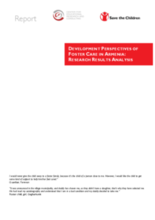This report produced by the Center for Educational Research and Save the Children summarises a broader research study which examined the foster care pilot programme introduced in Armenia in 2005. The study aimed to find out if the pilot program succeeded, what problems arose, how the program could be improved and how foster care in Armenia could develop and expand effectively. Childcare and child protection in Armenia has undergone dramatic change since 1991 and is still in the process of development. While the legal bases for adoption, guardianship and foster care exist and placing a child deprived of parental care (DPC) in an institution is officially a last resort, in practice institutions are still used more widely than other forms of care. Nearly 2,000 children in Armenia live in residential care institutions. According to data provided by the Government, 75% of children in state residential childcare institutions have some kind of disability, although many NGOs and community advocates believe this number is exaggerated. Foster care is not a widespread practice in Armenia. As of December 2012 there were around 15 'active' foster families in the country, although there is government commitment to support 25 foster families. Fostering in Armenia is mostly long-term, and often confused with adoption for this reason. Only two out of 15 foster parents interviewed for this research had experienced short-term fostering.
Overall, the research found that fostering is a positive experience for children and their foster families. Children interviewed in the foster care system were satisfied with the services they received. They successfully integrated in society, made friends and relationships, and could openly communicate with others in their community. However, the report highlights that the foster care model would benefit from better support to foster families. The great majority of foster parents interviewed did not want to foster another child for various reasons, and most potential foster parents interviewed did not want to foster either. Even fewer existing/potential foster carers, including staff with specialist childcare experience, were willing to foster children with disabilities - most citing a lack of psychological preparedness and access to appropriate supportive services. This research study identifies a number of factors that limit the expansion of foster care in Armenia, including a lack of awareness of different forms of foster care and the limited availability of social services and social workers, particularly in rural areas, that reduces the support available to potential foster families. The current legal framework hinders expanding foster care - especially short-term foster placements that may particularly benefit children with disabilities - because fostering is only available to children deprived of parental care , whereas institutional care is available to children who are not officially DPC. The authors make a number of important recommendations, beginning with reducing the need for fostering and other forms of alternative care through better preventive and community-based support services for biological families and legal guardians. They also recommend developing short-term and emergency models of foster care to meet children's needs effectively, and devising a more comprehensive approach to the care of children with disabilities, particularly through increasing community support services and treating foster care as a paid job.

